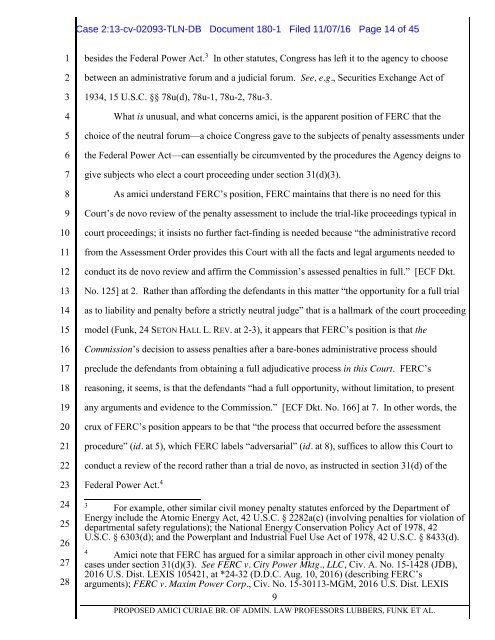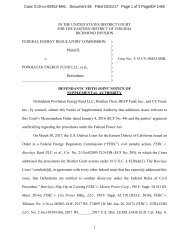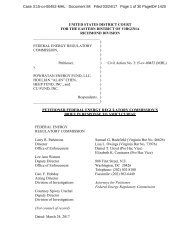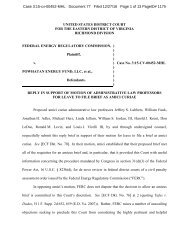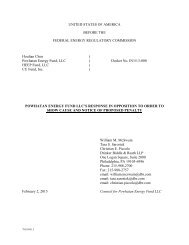FERC-v.-Barclays-180-1-Proposed-Brief
FERC-v.-Barclays-180-1-Proposed-Brief
FERC-v.-Barclays-180-1-Proposed-Brief
Create successful ePaper yourself
Turn your PDF publications into a flip-book with our unique Google optimized e-Paper software.
Case 2:13-cv-02093-TLN-DB Document <strong>180</strong>-1 Filed 11/07/16 Page 14 of 45<br />
1<br />
2<br />
3<br />
4<br />
5<br />
6<br />
7<br />
8<br />
9<br />
10<br />
11<br />
12<br />
13<br />
14<br />
15<br />
16<br />
17<br />
18<br />
19<br />
20<br />
21<br />
22<br />
23<br />
24<br />
25<br />
26<br />
27<br />
28<br />
besides the Federal Power Act. 3 In other statutes, Congress has left it to the agency to choose<br />
between an administrative forum and a judicial forum. See, e.g., Securities Exchange Act of<br />
1934, 15 U.S.C. §§ 78u(d), 78u-1, 78u-2, 78u-3.<br />
What is unusual, and what concerns amici, is the apparent position of <strong>FERC</strong> that the<br />
choice of the neutral forum—a choice Congress gave to the subjects of penalty assessments under<br />
the Federal Power Act—can essentially be circumvented by the procedures the Agency deigns to<br />
give subjects who elect a court proceeding under section 31(d)(3).<br />
As amici understand <strong>FERC</strong>’s position, <strong>FERC</strong> maintains that there is no need for this<br />
Court’s de novo review of the penalty assessment to include the trial-like proceedings typical in<br />
court proceedings; it insists no further fact-finding is needed because “the administrative record<br />
from the Assessment Order provides this Court with all the facts and legal arguments needed to<br />
conduct its de novo review and affirm the Commission’s assessed penalties in full.” [ECF Dkt.<br />
No. 125] at 2. Rather than affording the defendants in this matter “the opportunity for a full trial<br />
as to liability and penalty before a strictly neutral judge” that is a hallmark of the court proceeding<br />
model (Funk, 24 SETON HALL L. REV. at 2-3), it appears that <strong>FERC</strong>’s position is that the<br />
Commission’s decision to assess penalties after a bare-bones administrative process should<br />
preclude the defendants from obtaining a full adjudicative process in this Court. <strong>FERC</strong>’s<br />
reasoning, it seems, is that the defendants “had a full opportunity, without limitation, to present<br />
any arguments and evidence to the Commission.” [ECF Dkt. No. 166] at 7. In other words, the<br />
crux of <strong>FERC</strong>’s position appears to be that “the process that occurred before the assessment<br />
procedure” (id. at 5), which <strong>FERC</strong> labels “adversarial” (id. at 8), suffices to allow this Court to<br />
conduct a review of the record rather than a trial de novo, as instructed in section 31(d) of the<br />
Federal Power Act. 4<br />
3<br />
For example, other similar civil money penalty statutes enforced by the Department of<br />
Energy include the Atomic Energy Act, 42 U.S.C. § 2282a(c) (involving penalties for violation of<br />
departmental safety regulations); the National Energy Conservation Policy Act of 1978, 42<br />
U.S.C. § 6303(d); and the Powerplant and Industrial Fuel Use Act of 1978, 42 U.S.C. § 8433(d).<br />
4<br />
Amici note that <strong>FERC</strong> has argued for a similar approach in other civil money penalty<br />
cases under section 31(d)(3). See <strong>FERC</strong> v. City Power Mktg., LLC, Civ. A. No. 15-1428 (JDB),<br />
2016 U.S. Dist. LEXIS 105421, at *24-32 (D.D.C. Aug. 10, 2016) (describing <strong>FERC</strong>’s<br />
arguments); <strong>FERC</strong> v. Maxim Power Corp., Civ. No. 15-30113-MGM, 2016 U.S. Dist. LEXIS<br />
9<br />
PROPOSED AMICI CURIAE BR. OF ADMIN. LAW PROFESSORS LUBBERS, FUNK ET AL.


